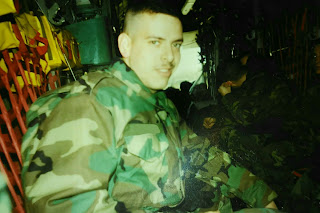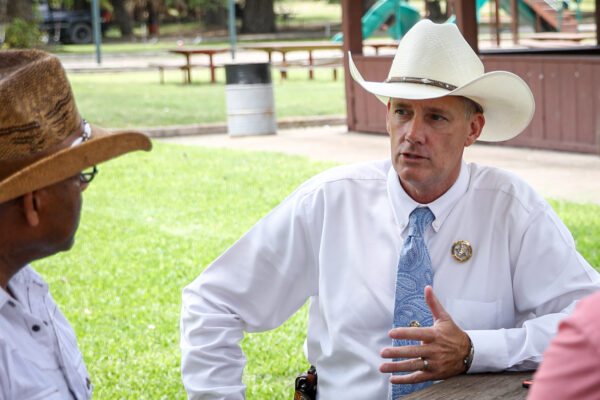Texas Sheriff: ‘It’s Not a Border Crisis, It’s a Fight Between Good and Evil’
Two hundred miles north of the border, Sheriff Roy Boyd of Goliad County, Texas, has placed warning signs at his county line, written in Spanish.
“They’ll drop them off at a temporary holding site and then someone from Houston comes and picks them up and then takes them to Houston, where they’re distributed across the United States,” he told The Epoch Times.
A Honduran woman’s body was found dumped in the brush on private property in the county after she had been smuggled from the border in March, Boyd said. In another case, an old shed on a ranch was being used to strip stolen vehicles in preparation for smuggling people.
The sheriff said Homeland Security Investigations (HSI) is currently investigating a large-scale human trafficking hub in Goliad County.
“It has the potential, from what I’m told from HSI, to be the largest human trafficking investigation in this region in history,” Boyd said.
“Most of these people are being put in indentured servitude. They’re slaves right here in our own country. And we all know it’s taking place, and we’ve known for quite some time.”
U.S.-bound human smuggling and related criminal activities provide cartels with estimated revenues of $2 billion to $6 billion per year, according to John Condon, acting assistant director of international operations at HSI, during a July 28 congressional hearing.
Although the state and some counties are doing what they can to mitigate the border crisis, Boyd said it needs to be stopped at the border.
“The thing that’s going to stop it is taking a hard line with Mexico,” he said. “We have to make the pain of legitimate economic loss worse than the gain of their partnership with the cartel. The only way to do that: shut the ports off, turn off the spigot.”
Boyd said an illegal alien arrested in his county recently was on her fifth attempt to get into the United States undetected.
“The first time, they had a raft malfunction, she couldn’t make it in. Then the next three times, she actually got caught in the [Rio Grande] Valley and got deported—handed over to the Mexican government, who put her on a bus, took her to Monterrey, and handed her over to the cartel, because now the cartel charges her to get back up to Reynosa to get across the border,” Boyd said.
“And so every time she pays the cartel, the government gets a cut. So the Mexican government is happy to deliver illegal aliens, Central Americans, back to the cartel.”
The Rio Grande Valley in south Texas is the busiest sector along the 2,000-mile border with Mexico. This year, Border Patrol agents have been pulled off the border constantly to process an unprecedented number of illegal aliens who are turning themselves in after crossing.
Two weeks ago, border agents in the Rio Grande Valley apprehended 20,000 such illegal immigrants in one week. It’s impossible to estimate the number of individuals that evade Border Patrol and disappear undetected.
Boyd said he’s been dealing with border issues since 2005, but has “never seen anything quite like this.”
“Things pretty much started drying up on the border during the last administration. Things were pretty much under control,” he said at a public meeting in April.
“Well, that came to a real fast end, and [now] it’s the Wild West on steroids.”
Boyd said he doesn’t view the current issue as a border crisis, but rather “a fight between good and evil.”
“The evil is communism, the evil is cartels, the evil is the drugs that they put on our streets,” he said.
“The problem is, good people don’t want to recognize that evil exists, because it makes them uncomfortable. And the only way to fathom the totality of this conflict we’re in is to realize there is evil. And good must rise up, or the evil will take over.
“I want my children to grow up free. I don’t want them to grow up in a faux Republic that’s really a socialist-communist state. But that’s where we’re heading.”
Original Here

|
⭐⭐⭐⭐⭐
-Tex


